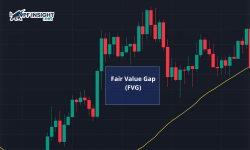Weekend holding rules are an important element of proprietary trading that traders should not ignore. These rules are in place to minimize the possibility of significant price fluctuations when the market reopens. Understanding the weekend holding rules allows you to adjust your strategy, especially for long-term trades. Let’s learn more about this policy with PF Insight in the article below.
Why is the weekend holding rule necessary for traders?
Brokerage firms in the financial industry, also known as proprietary firms, provide capital to traders so that they can trade at a larger scale than they would with their own capital. In return, traders receive a portion of the profits from the trading results. Professional traders can take full advantage of market opportunities with the help of this model. However, to manage risk and protect capital, each firm has its own policies, especially regarding weekend holding rules.
One important factor that directly affects how you handle your trades when the market is closed on Friday afternoon is weekend holding rules. Because sudden moves can lead to significant losses, many firms impose restrictions to reduce the likelihood of a price gap when the market reopens on Monday. However, some firms allow holding under strict conditions, such as reducing leverage, maintaining safe margin levels, or requiring the use of risk management tools such as stop-loss orders.
The purpose of weekend holding rules is to protect capital and encourage traders to carefully consider their options before making a trade. These rules encourage traders to practice discipline and manage risk responsibly rather than focusing solely on profits.
For example, stock or forex traders must take into account the potential volatility that can result from political or economic news that occurs outside of normal business hours. Maintaining a stable strategy and minimizing risk can be facilitated by understanding and adhering to company policies.
Weekend holding rules common at prop firms

Whether or not a trader is allowed to hold positions over the weekend is clearly defined by some proprietary trading firms. When it comes to weekend holding rules, policies are typically divided into three main groups:
Do not hold orders overnight or over the weekend
To minimize the risk of unexpected volatility, many proprietary trading firms have adopted weekend holding rules. Large price gaps can occur at the opening of the market on Monday when the market is closed due to political, economic or other unexpected events. Therefore, trading positions are exposed to uncontrolled risk. Firms can protect capital and minimize losses due to unexpected volatility with this policy.
Hold conditional weekend orders
Depending on the company’s policy, some brokerages allow traders to hold positions over the weekend, but usually only during the evaluation period or after funding has been provided. Limiting the amount of equity that can be affected by holding a position during market closing hours is one of the restrictions they impose to control risk. These guidelines aim to balance trading opportunities with the security of the trader’s account.
Allowed to hold orders on weekends
Some firms have a more flexible policy, allowing traders to hold positions over the weekend with few restrictions. In this case, traders can open any type of order with any size as long as they are confident that they can manage their risk successfully. Experienced traders who value caution and want to profit from post-weekend volatility will find this option appealing.
When should traders hold orders on weekends?
Weekend holding rules always pose unpredictable risks for traders. However, whether or not to hold orders over the weekend depends on the market context and each trader’s risk management and experience.

Case 1: Do not hold orders over the weekend
Traders should not hold orders over the weekend or overnight for the following reasons:
- Weekend price gap: Prices often fluctuate sharply when the market reopens after a week, either rising sharply or falling sharply from the previous close. The main cause comes from external factors such as economic news, global political events or unexpected geopolitical fluctuations that occur while the market is closed, creating unpredictable price gaps for traders.
- Low liquidity: Liquidity often drops sharply when the market reopens after the weekend, resulting in large spreads and slippage. Even stop-loss orders may not be filled at the desired price in this case, putting traders at risk of incurring larger losses than expected.
- Volatility from unexpected events: Volatility can increase over the weekend due to unexpected news or socio-political upheaval. Prices often react strongly when the market reopens, posing significant risk to open positions.
Case 2: Should keep the order at the end of the week
Traders should only hold orders when the following conditions are met:
- Be confident in your analysis: You can still consider opening a small position if you are confident in your analysis and predict a gap. However, always take the necessary precautions to protect your capital and avoid losing control of the position.
- Partial trade management: To preserve the opportunity, some traders decide to close a portion of their position before the market closes on Friday, leaving a small portion open. To minimize the impact of unforeseen weekend volatility, strict risk management procedures are always applied in conjunction with this option.
- Hedging positions: Traders will open new positions in closely related instruments to balance the risk of their existing trades. By adopting this approach, directional risk is minimized and the impact of unforeseen price movements is also minimized.
The secret to optimal trading with weekend holding rules
Brokerage weekend holding rules can be influenced by a variety of factors. By being aware of these variables, traders will be able to plan ahead and adjust their trading strategies to suit the needs of the market.

Implement risk management strategy
The basis of weekend holding rules is risk management. Many exchanges have implemented measures to mitigate the negative impact of sudden market swings during market closures. Large price swings can be caused by events such as political crises, important economic data, or world news, which can affect open positions.
Some firms require traders to close positions before the market closes on Friday to minimize risk. Others allow positions to be held over the weekend, but use less leverage or limit the size of trades. It is important to assess your individual risk tolerance to determine whether these policies are appropriate.
Risk factors from market fluctuations
Weekend holding rules are always affected by market volatility. Brokers often tighten the rules to reduce risk during sensitive times, such as when important economic data is released or political events occur. By taking these precautions, traders are protected from the risk of prices rising or falling suddenly at the open.
Investor trading habits
How traders operate in the market has a big impact on how firms manage their holdings over the weekend. Firms often consider each investor’s level of discipline, risk management, and trading patterns to determine appropriate policies. To reduce risk, tighter rules may be applied to new traders or those who consistently lose money. Conversely, profitable and experienced clients often enjoy more flexible policies.
How to choose a proprietary trading firm that complies with weekend holding rules
Whether weekend holding rules fit your trading style is an important factor to consider when choosing a proprietary firm. These rules can directly affect the flexibility of your strategy, your ability to manage risk, and your profitability. Therefore, choose a firm whose rules best support your trading process and clearly define your goals and risk tolerance.

Consider your trading strategy and personal goals
You need to determine whether weekend holding rules fit your trading strategy. Closing your positions before the market closes may be more appropriate if you are a short-term trader. On the other hand, if you are a long-term trader, holding positions over the weekend may be important to stick to your plan.
You will benefit from choosing a firm with a flexible weekend holding policy if you want to wait and see and benefit from long-term volatility. On the other hand, strict regulations are often less important for short-term traders. Having a clearly defined goal will help you make better decisions.
Find out the details of each company’s regulations
Look into each firm’s weekend holding rules to ensure they fit your trading strategy, and consider whether they completely prohibit holding positions over the weekend or only allow them with some restrictions such as low leverage or position size limits.
Your profits may be directly affected by additional costs or special requirements imposed by some proprietary firms. When comparing policies, consider what conditions you are willing to comply with and how often you plan to hold positions over the weekend. Understanding weekend holding rules in advance will help you avoid unnecessary expenses.
Consider your personal risk tolerance
Based on your risk tolerance, choose a broker that has weekend holding rules. For new traders or those who want to avoid the high risk of trading with a funded account, highly regulated brokers are a good choice as they often limit spread risk. Conversely, firms with flexible weekend holding rules are suitable if you are a seasoned trader who understands risk management and wants to manage your entire position. This will allow you to maximize your strategy and take advantage of market opportunities.
Your choice of broker will depend on the level of control you desire over your trades. A trading strategy that balances flexibility and risk tolerance will be more effective and support your personal financial goals.
Conclude
When dealing with brokerage firms, it is important to be aware of weekend holding rules. Your ability to control risk and execute profitable trading plans is directly affected by these rules. You can adjust your trading strategy to meet the specific rules of the firm, while still maintaining control over your options and positions, which will help you maximize your profits and minimize your risk.
Choosing a broker whose rules align with your goals is important, regardless of whether you are pursuing a short-term or long-term strategy. Choosing the right one will help you trade with confidence, maintain a flexible strategy, and manage your risk successfully, laying the foundation for sustainable success in the markets.







